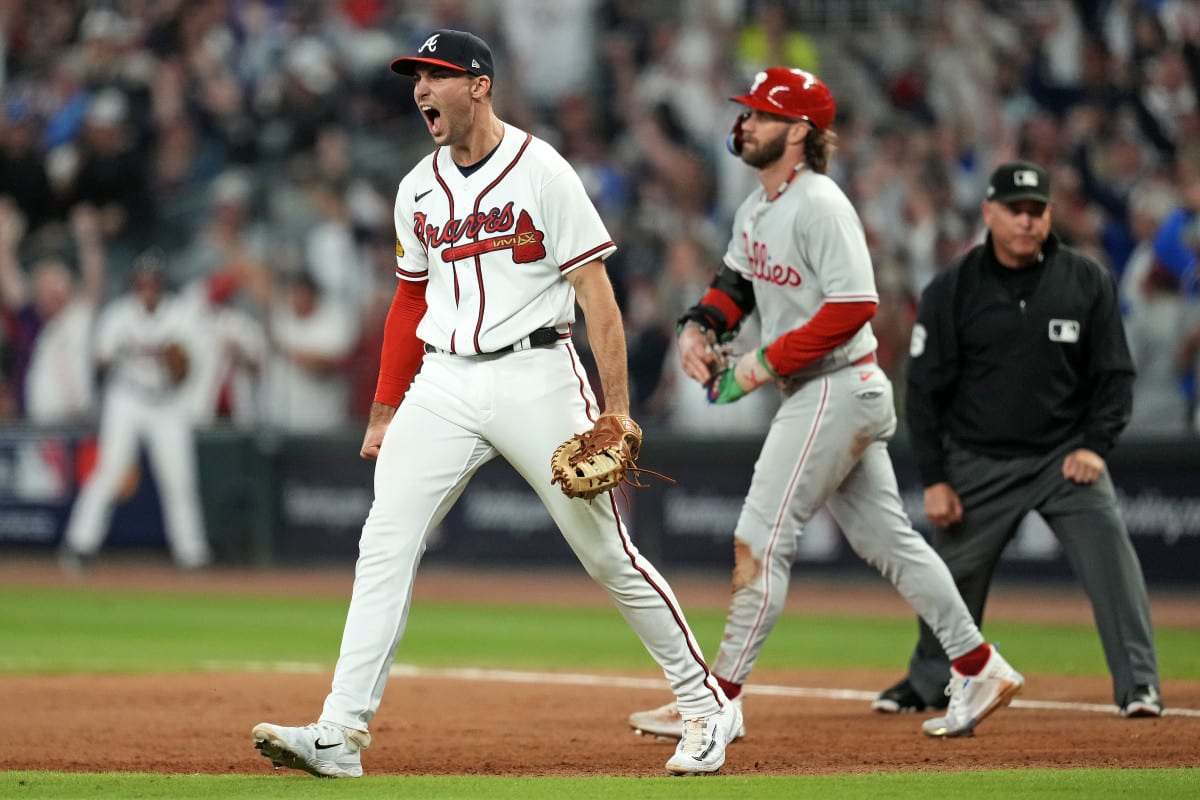Austin Riley did two things wrong Monday night. He wasn’t supposed to swing at that pitch. He wasn’t supposed to be there for that play. But he did, and he was, and he just might have saved his team’s season.
“Right place, right time,” he says with a grin.
The National League Division Series is now tied at one game apiece after Atlanta snatched Game 2, 5–4. The Phillies blanked Atlanta in Game 1—the first time Atlanta had been shut out at home in two years—and seemed close to doing the same thing in Game 2, setting up an elimination game at hostile Citizens Bank Park. Ace Zack Wheeler took a no-hitter into the sixth inning, the offense put 16 men on base and the team enjoyed a win probability of 92% with 10 outs to go.

Dale Zanine/USA TODAY Sports
That 8% strode to the plate with a man on first and two outs in the eighth inning, down 4–3.
For six innings, Wheeler had baffled them. He struck out six of the first seven men he saw and eight of the first 11. The only man who reached base in the first five frames did so on an error by shortstop Trea Turner. Wheeler went to a three-ball count only four times. But the fourth was a two-out, sixth-inning walk to right fielder Ronald Acuña Jr., who took second on a single and scored on another Turner error.
“It was kind of nice to score a run,” Atlanta manager Brian Snitker says wryly. “It’d been a while.”
In the seventh, first baseman Matt Olson singled, and catcher Travis d’Arnaud homered to chase Wheeler from the game. With one out in the eighth, Phillies reliever Jeff Hoffman hit Acuña. He took second on a groundout. Up came Riley.
In his first three at bats, Riley had struck out twice and rolled over to second base. “I was trying to do too much,” he says. With Acuña in scoring position, Riley just wanted to hit a line drive and tie the game.
The first pitch was a slider, down and in, which Riley fouled off. He took a fastball high, then just missed a fastball over the plate. The next pitch was a slider, down and away, which Riley laid off. He laid off a four-seamer in the same location. Catcher J.T. Realmuto called for a slider low and away. The selection made sense: Riley saw 131 sliders down and away this season. He had one hit, a soft liner over second base.
Riley figured he’d see a fastball. His whole career, he has struck out about a quarter of the time, and his whole career, he has been trying to cut down on that number. That has been a particular focus of the team this year; as a group, they have reduced their strikeout rate by nearly a sixth, from 24.6%, 27th in the sport, to 20.6%, fifth. So with two strikes, he shortened his swing.
Neither Realmuto nor Riley got what he expected. Hoffman missed, toward the middle of the plate. Riley was out in front, looking for the fastball, but because he had shortened up, he was able to peel off his bottom hand and keep his bat in the zone.
“I was holding on for dear life,” says Riley. “When you’re staying on the fastball the other way, it allows you to stay on the offspeed and give yourself a chance.”
The ball shot into the Phillies’ bullpen at 100.2 mph—not bad for a one-handed swing.
“He’s a big Mississippi boy,” says Olson. “He’s very strong.”
Fireworks exploded, as did the crowd of 43,898—the largest in the seven-year history of Truist Park. Riley is not a demonstrative man, but he allowed himself a roar as he circled the bases to give his team the lead.
Still, Atlanta needed three more outs. They did not come easily. First baseman Bryce Harper walked to lead off the top of the ninth, and Snitker summoned closer Raisel Iglesias, who got an easy pop-up for the first out.
The next hitter was right fielder Nick Castellanos, who got a 2–2 fastball and drove it 392 feet to a part of the wall that is just about 393 feet from home plate. Center fielder Michael Harris II darted back, planning to “put my body on the line,” he says. “I wasn't stopping. I was doing anything I could to get a glove on it.” He hurled himself at the baseball, snared it as he crashed into the wall and immediately spun and flung it toward second base.
But Harris, in his haste to get the ball back to the infield, had not noticed that Harper had dashed for third, thinking the ball would drop, and was now trying to motor back to first. He had not noticed Olson at first base, waving his arms like an air traffic controller. He had not noticed Riley screaming, “One! One!” Harris just fired to second, where he expected Harper to be. He overthrew the first cutoff man, shortstop Orlando Arcia, stationed in short center field. The throw also missed the second cutoff man, second baseman Ozzie Albies, stationed just behind home plate.
Only one man at Truist Park understood what was about to happen. Riley “came out of nowhere,” Olson says, the momentum of his screams having carried him toward the middle of the field. “Realistically, [I was supposed to be] closer to third base,” Riley says sheepishly. But he wasn’t, which meant he was in position to backhand the ball and sidearm it to first to double up Harper and seal the victory.
It was the first 8-5-3 double play in postseason history. It has a case for most spectacular game-ending play in postseason history. It kept Atlanta alive. It was exactly the right thing to do.







